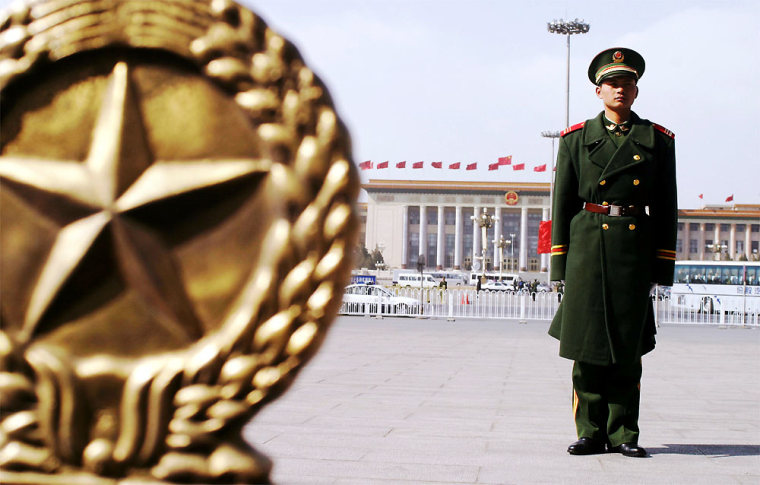China on Saturday announced an 11.6 percent hike in military spending for 2004, a bigger increase than last year in an age when the People’s Liberation Army is racing to make itself competitive and adapt to a high-tech world.
The figures came in a budget report prepared for delivery by Finance Minister Jin Renqing at the National People’s Congress, the country’s nominal legislature, on its second day. They were released at a time when the government has publicly prioritized social programs.
In his remarks, Jin said the budget deficit would hold steady after years of annual increases. He also outlined a spending increase of $2.64 billion for the PLA.
His budget report did not give the total spending figure for China’s military. But last year’s announced military budget was $22.4 billion, though the actual figure is believed higher.
This year’s increase was allotted “in order to improve the defensive combat readiness of the armed forces under high-tech conditions and to raise the salaries of army personnel and the pensions for ex-servicemen,” Jin’s remarks said.
“In addition, we must work hard to ensure adequate funding for other expenditures that have a direct overall bearing on reform, development and stability,” he said.
Aid for poor, farmers
On the NPC's opening day on Friday, China’s Premier Wen Jiabao said the country would continue to focus on economic growth, albeit at a somewhat slower pace, and would take more action to help the poor.
Speaking on a stage festooned with red flags and other traditional emblems of Chinese communism, Wen heralded China’s newly confident profile in foreign affairs.
“We enjoy higher status and greater influence in the international arena than ever before,” he said.
His speech opened a 10-day session of China’s largely ceremonial legislature that will consider the decidedly uncommunist goal of enshrining protections for private property in the constitution. The Communist Party has made the change a priority, and it is certain to be endorsed.
Wen said he expected 7 percent growth in the Chinese economy during 2004, and he targeted a key priority of the leadership: lifting hundreds of millions of rural Chinese from poverty.
He said farm taxes would be reduced immediately and then eliminated within five years — a remark that elicited hearty applause among the thousands of party-approved legislators gathered from all corners of China, still a predominantly rural nation.
Relief for farmers
The government also will subsidize grain producers at a cost of $1.2 billion this year, Wen said.
“Rural incomes have grown too slowly,” Wen said. “The income gap is too wide among some members of society.”
China’s economy grew a blistering 9.1 percent last year, but much of that was concentrated in the nation’s already prosperous coastal cities. Even newly rich urbanites, who once looked down on their country cousins, now voice distress that the average farm income remains less than $1 a day.
Delegates to the legislature also cited the gap between rich and poor as a key problem facing China. Not only do lagging farm incomes threaten social stability and communist rule, they also reduce purchasing power.
“The plight of the farmers is pressing,” said Zhu Weifang, a delegate from the southeastern province of Anhui.
Standing tough on Taiwan
Wen also promised a beefed-up military and no compromise on Taiwan, the self-ruling island that China says is part of its territory and has threatened to retake by force Taiwan moves toward independence.
The new military budget comes just days ahead of a presidential election and a referendum in Taiwan on the missiles China has pointed at the island.
Wen amplified the government’s oft-stated policy that China “will never allow anyone to split Taiwan from China by any means.” But he also reiterated that peace was the preferred path.
“We will do everything possible to bring about the peaceful reunification of the motherland,” he said.
The sides separated in 1949 during a civil war that ended with the communists taking power on the mainland.
Wen said the leadership was “stepping up efforts” to make sure the 2.5-million-strong People’s Liberation Army is up to any task it faces.
“We will energetically carry forward military reforms with Chinese characteristics and work hard to modernize national defense and armed forces to a higher stage of development,” Wen said.
Those reforms include developing new high-tech weapons and equipment and training “a new type of highly competent military personnel,” the government’s Xinhua News Agency said.
Much new economic growth will come from private enterprise, especially as China seeks more jobs for recent college graduates and farmers who travel to cities looking for work, Wen said.
Bolstering the private sector
“We will vigorously promote the development of the nonpublic sector,” he said. “Governments at all levels must promptly eliminate or revise regulations and policies that restrict the development of this sector.”
The private-property amendment to the Chinese constitution — the first such protection since the 1949 revolution — mandates that “private property obtained legally shall not be violated” and will be “on an equal footing with public property.” It could boost commerce by making it easier for entrepreneurs to get loans, by using their property as collateral.
“Amending the constitution to protect private property is the most important issue,” said Xu Shaofang of Jiangxi province, a delegate to the Chinese People’s Political Consultative Conference, the NPC’s companion advisory body.
“Our country will never get better if we don’t improve and open up.”
Lawmakers also will review measures to stamp out corruption, which is endemic throughout China.
“We will work harder to build a clean government,” Wen said, promising to “resolutely” punish lawbreakers.
China’s parliament usually rubber-stamps policies already decided by the Communist Party. It is not a forum for robust debate, though in recent years it has become an important forum for keeping Chinese leaders in touch with rapid social and economic changes.
